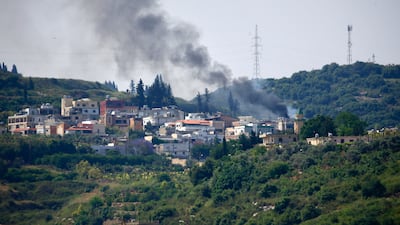Lebanon remains a forgotten front in the ongoing war in Gaza, despite the fact that more than 1,300 Lebanese, both civilians and combatants, have been killed or wounded since October 8, over 93,000 people have been displaced, and many southern border villages have faced major destruction. Yet some observers believe this may only be the beginning once the Israeli military operation in Gaza comes to an end.
Their rationale is that after Israel imposes its will in Gaza, it will have an impetus to do the same in Lebanon, if only to allow for a return of tens of thousands of inhabitants from the north who were evacuated after October 7. Certainly, some kind of agreement will have to be reached, as the Israelis are unlikely to accept a return to the status quo ante on the Lebanese-Israeli border.
Yet several factors may derail this prediction. The first and most obvious one is that the Gaza fighting is not over, and indeed doesn’t appear to be near a conclusion. More importantly, this has led to rifts inside Israel’s government, and between the government and military, over what should come next. Prime Minister Benjamin Netanyahu refuses to hand over to a Palestinian administration in Gaza, which has left his army fighting without a clear political endgame.

In light of this, it seems less probable that we are on the eve of a Lebanese war. Moreover, the regional implications of such a war would be severe, at a time when the US on the one side and Iran and Hezbollah on the other, have sought to avoid any escalation that could lead to a regional conflagration. The recent exchange of fire between Iran and Israel, which seemed choreographed to avert the worst, reaffirmed the reluctance by all sides to engage in a catastrophic escalation.
That may well be the outcome, however, if Israel were to do in Lebanon what it has done in Gaza. In the event Hezbollah were seriously threatened, Iran would not stand by and allow this to happen. It didn’t when Syrian President Bashar Al Assad was in danger a decade ago, and it certainly won’t do so if its Lebanese ally is.
But there are also broader issues at play. The nearly eight-month conflict in Gaza has had major divisive repercussions around the world, especially in western countries. It seems improbable that Israel would have the latitude to embark on a major war in Lebanon so soon after Gaza, one that could be more devastating and longer.
Nothing prevents Israel from invading, and Washington is unlikely to leave it in the lurch. However, given the anger in the Joe Biden administration over Mr Netanyahu’s refusal to offer a realistic political plan for Gaza, it is fair to assume that the Americans would think long and hard before sustaining a major Israeli operation in Lebanon when the outcome remains so uncertain and the risks so high.
The repercussions of the Gaza war, especially Israel’s wanton killing of upwards of 35,000 Palestinians, mainly civilians, according to local health authorities, have wreaked havoc in western capitals, not least in universities. It is possible that this could cost Mr Biden his re-election, with Arab Americans and many younger voters denying the President their vote in protest against his Gaza policies. This could lose him key swing states.
Even in Israel, there must be considerable fatigue with the Gaza war, one of the longest Israel has ever conducted. To immediately follow this with an even more complicated campaign in Lebanon could provoke a negative reaction from Israelis. While polls show that many voters would support a war, a large number of them also believe Mr Netanyahu is prolonging the fighting to remain in office.
Yet even if the Americans may not go along with a widening of the war, that does not mean they would oppose a limited escalation along the border that seeks to make Hezbollah more pliable in talks over new security arrangements with Israel. In fact, such a scenario may be inevitable, in part because Hezbollah helped make it so.
When the US envoy Amos Hochstein visited Beirut several months ago, he was told that Hezbollah would not discuss anything until the Gaza war was over. Mr Hochstein went along with the condition, aware that once it was met, it would allow Israel to transfer forces to the Lebanon border and increase US and Israeli leverage in defining a new reality in the area.
Yet if that’s the Americans’ thinking, it suggests they and the Israelis ultimately favour talks over a full-scale war. Their aim, reflecting US and French proposals, would be a withdrawal of elite Hezbollah units from the border, albeit not necessarily to the Litani River as outlined in UN Security Council resolution 1701, which ended the 2006 Lebanon war; deployment of the Lebanese army in the border zone; greater freedom for the UN force in southern Lebanon; an end to Israeli overflights; and demarcation of contested segments of the Lebanese-Israeli border.
Hezbollah would publicly reject a number of these conditions. However, it would also probably calculate that several can be manipulated to its advantage. For example, the Lebanese army will never prevent young Shia men from entering border villages from where they originate. That means the party, in exchange for cosmetic concessions that lead to calm along the border (calm the party desires), would yet retain a way to surreptitiously redeploy its members to border areas.
It would be a mistake to over-confidently assert that a Lebanon war won’t happen, as anything can go wrong in the Middle East these days. Yet the elements working against a full-scale conflict are at least as potent as those working to the advantage of one. Time will tell which outcome prevails.


